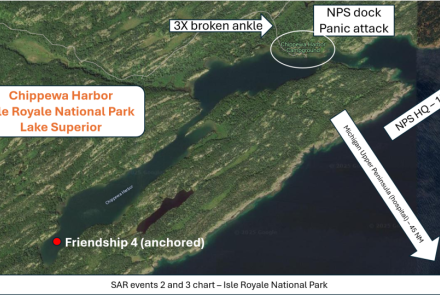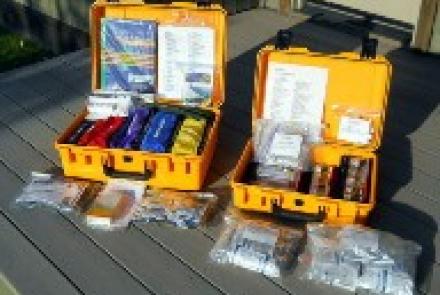Fire in the Boat – Prevention
One of the most desperate emergencies aboard is a fire in the boat. Other articles discuss how to react to fires; this note is to try to have you minimize the chance of fire.
Fire has to be dealt with quickly. If you cannot get the fire out fast, your only remedy may be to abandon ship. Prevention is key.
Prevention falls under two categories:
- Inspection and maintenance of key components aboard.
- Good habits aboard the vessel.
Inspection and Maintenance of Key Components
Our boats are filled with mechanical and electrical components, frequently hidden out of sight behind luxury woodwork. All those components also suffer from pounding and flexing as we work through seas, or vibrations as we power along. Thus the age of the boat also detracts from the fire-proofing of some components along with the occasional less-than-perfect workmanship.
Here are some components that need to be checked:
- All electrical wiring. As wire ages, vibration can break some of the strands, even in good boat wire. Especially in high amperage areas, partially broken wiring can heat up very quickly. These areas include:
- Shore power wiring
- Battery connections
- Charging circuits
- Circuits in engine rooms
- Windlass and electric winch circuits.
- need to check wiring in these circuits annually, or after repairs are made to the component or circuits. For example:
I once watched the voltage out of my “just repaired” generator rise to 650 volts, as I ran to shut it off. Fortunately the repairman was still aboard.
- Alternators on engines frequently have wires wear from vibration right at the connector to the back of the alternator. The wires must be cable-clamped to the alternator bracket so engine vibration does not wear the wire at the alternator. The vibration is taken up by a much longer section of wire farther away.
My windlass lives in a very hostile environment: the anchor locker. The wires up there constantly are exposed to a salt water environment and high accelerations. We need to keep the connections refreshed, and all water protection in place, or the high amperage may cause real problems.
- All fuel lines and tanks need to be checked annually. Yes, even diesel engines and generators need to have their lines checked. If you have a gasoline engine below, make extremely sure every line is perfect. Check for tank leaks too. At the hint of any leak, trace the source and replace the line with the ABYC-approved hose.
- Electronics and their chargers, converters, etc. now also can generate considerable heat. Check the wiring for hot spots, and make sure all connectors are clean. Keep charging devices in areas with adequate ventilation.
- Stove propane fuel is held in self-draining lockers on (almost) all boats now. But the hose from the locker to the stove must be checked, especially the very flexible part near the stove, that constantly flexes due to the stove swinging on its gimbals. If the hose is over five years old, check it twice, especially where it passes through bulkheads, or is supported by cable ties. You can do a simple check for hose leakage, and you should do so annually. If you do not know the check, contact your surveyor.
- Make sure the solenoid switch in the propane locker is working. Use it!
- Have propane detector(s) aboard. If you have a gasoline engine, have gasoline detector(s) aboard too. Know how to test the detectors, and do so.
- Maintain your fire extinguishers. In addition to checking the gauge or weight annually, some recommend you shake them monthly to avoid the extinguishing materials from caking in one corner of the tank.
Good Habits Aboard the Vessel
Some simple practices can help minimize the chance a fire onboard with the potential to cause the loss of the vessel or of life.
Never store flammables below. Dinghy gas cans need to be stored on deck in a secure area. Small amounts of flammables can frequently be squeezed into the propane locker. My butane torch goes there.
I am a bit nuts about this, but there is never any highly-volatile substances (like acetone) allowed below on ARAGORN. My wife removes nail polish only with non-volatile nail polish remover.
Turn the stove off by closing the switch for the solenoid before turning the last burner off. This lets the gas in the line empty and burn off at the stove. Assuming all components are functioning, no cooking gas should be able to come below. Many boats have this switch marked in red, as it must be turned off in a fire. Every crew member needs to know how to turn the stove propane fuel off.
Do not deep-fry or cook foods with lots of fats. Aside from the potential damage to the cook in a lurch, the chance for a fire from grease is just too great. If you want bacon aboard, half-cook it elsewhere, refrigerate and re-heat underway. Also, beware of adding alcohol: Bananas Flambé may become Galley Flambé , leading to Boat Flambé. Keep the fire blanket handy.
Some chargers for tablet or notebook computers heat up a lot. Do not let devices become buried under blankets, clothing, duffels, etc. to avoid heat buildup.
Some lithium batteries may become very hot if shorted or improperly charged. Assure their circuits do not short, and make sure they cannot be physically damaged. Larger versions of these batteries must have safety devices attached, and you still should be very cautious.
Enforce the rule: no open flames below decks, except at the stove. You may want to extend this to above decks too. This means no romantic candles that can be tipped over by a careless hand or errant wake. (Lest you think we have no heart, we did buy battery-driven, flickering “candles” that leave the same effect without the fire risk.)
If a breaker throws, investigate the circuit before resetting it. If you cannot explain the reason for the short, do not turn on the circuit again.
If you think you might, just possibly, smell smoke or burning insulation, investigate immediately. Some kinds of fires start off with just heated wood, plastic or rubber. If you can identify the source of the odor, you may prevent the fire from igniting.
Be careful when using tools near high-amperage circuits or near batteries. A simple screwdriver dropped across the terminals of a battery can be pyrotechnic!
Train your crew in all of the above, so they practice good habits too.
Train your crew in fire-fighting, including knowing the location of all fire extinguishers, any automatic extinguishers, the fire blanket, and all fuel shut-offs.
Again, there are other articles about fighting fires, and the equipment and preparation for that task. Please read those too, in case there is a fire despite your prevention!





